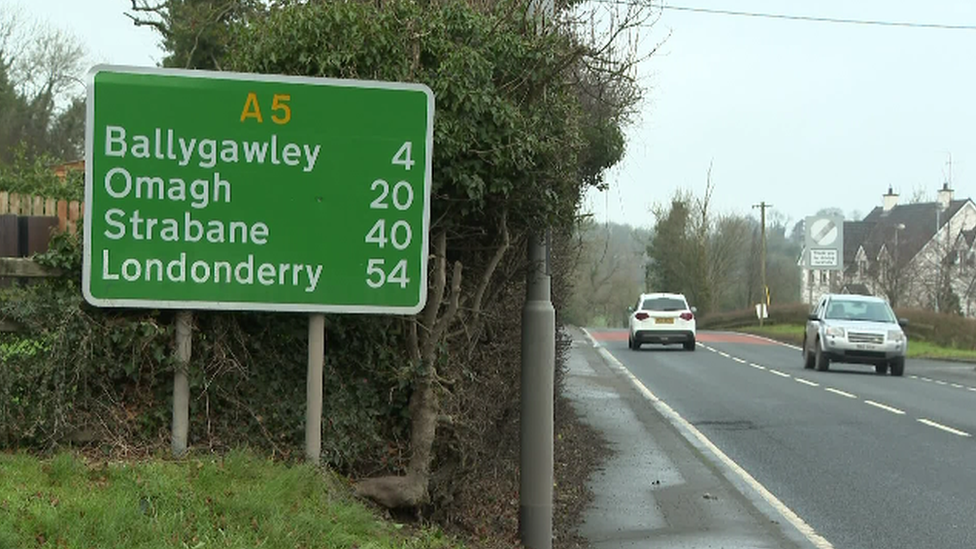A5 road upgrade to be completed by 2028, official says
- Published

More than 50 people have been killed on the A5 since 2006
A new dual carriageway to upgrade the existing A5 between Londonderry and Aughnacloy should be completed by 2028, a Stormont official has said.
It would be the largest road scheme ever undertaken in Northern Ireland, involving 53 miles (85km) of new trunk road.
The project has the support of all Northern Ireland political parties as well as the Irish government.
More than 50 people have been killed on the route since 2006.
The outline business case for the new road has now been approved by the Department of Finance (DoF).
A public inquiry is being held by the Planning Appeals Commission in Omagh, County Tyrone, to examine the £1.6bn scheme.
A senior official from the Department for Infrastructure (DfI) said he did not foresee any difficulties in funding the project.
He added he was "very confident" the new road would be completed by 2028.

Campaigners inluding bereaved relatives took part in a demonstration in Omagh on Tuesday
On Tuesday, the inquiry heard emotional testimony from people who have lost loved ones in accidents on the A5.
The inquiry has now moved to a new venue at Omagh Enterprise Centre where it has been examining the funding of the scheme, as well as the economic impact it would have.
Taoiseach (Irish PM) Leo Varadkar has indicated the Irish government would "engage constructively" with the authorities in Northern Ireland and is willing to provide a greater contribution towards costs than previously pledged.
Officials were also questioned about traffic forecasts which suggested 40% of road users on the A5 would see no significant change to journey times.
Reports also predicted a reduction in travel of less than 5%.
A transport planning consultant acting for the Alternative A5 Alliance, which opposes the scheme, described this reduction as "unremarkable".
DfI officials said if nothing was done the road network would approach capacity and the scheme would provide relief to congestion in towns.
It was also stated that the overall journey time along the length of the A5 would be reduced by 27 minutes.
'Loss and pain'
Daniel McCrossan, the SDLP MLA for West Tyrone, spoke at the inquiry.
He told BBC News NI the A5 "affects every aspect of our lives" for people living and working in the north west.
"Yesterday we remembered the 51 people who sadly lost their lives on that road since 2006, an unforgivable number, huge carnage and loss and pain has been endured by people here.
"And equally we're also suffering economically, huge economic disadvantage.
"Anyone looking at a map of Ireland will see very clearly there is an infrastructure deficit that people are suffering, a huge regional imbalance that has been allowed to continue and to worsen.
"This project, the A5 being delivered in its entirety, will redress a lot of those issues."
'Barrier to investment'
Representatives of local businesses described how delays on the current A5 added significant costs and were a barrier to investment.
Nick McCullough, managing director of logistics company Manfreight, has 200 trucks which use the A5.
He said delays on the current A5 were "a big cost to our business" and shorter journey times would make a significant saving in fuel costs and driver hours.
Cormac Cunningham from Strathroy Dairies in Omagh said his company made 200 journeys a day on the A5.
He said improving journey times would result in big savings and also help attract employees to want to work in the region.
He added every business had a duty of care for the health and safety of its employees.
Yet when it came to the A5 he believed "no one has a duty of care to citizens or society".
"This critical danger is not being addressed", he said.
On Thursday the public inquiry will examine alternatives to a new dual carriageway.
The campaign group Alternative A5 Alliance - made up of farmers, landowners and others with an interest in the County Tyrone area - opposes the compulsory purchase of land to construct the road.
The group has said improvements to the A5 have long been needed but could be achieved through bypasses and overtaking lanes on the existing carriageway.
They argue that this would be cheaper and have less of an impact on the environment and the livelihoods of landowners.
- Published30 May 2023

- Published10 May 2023
